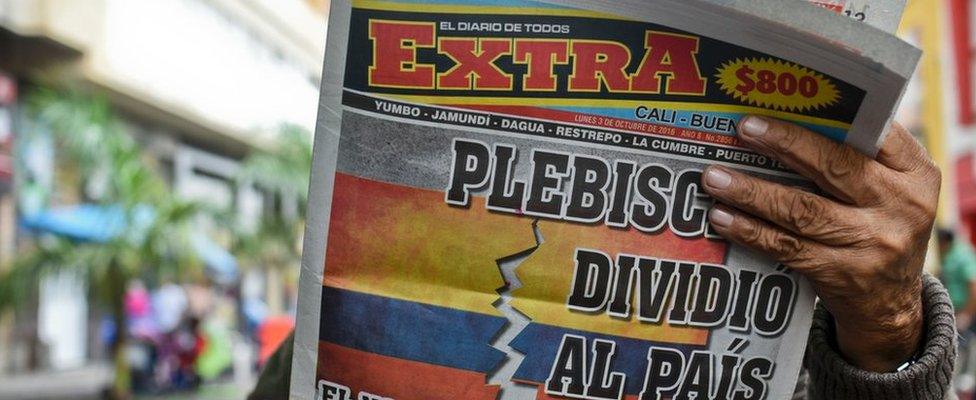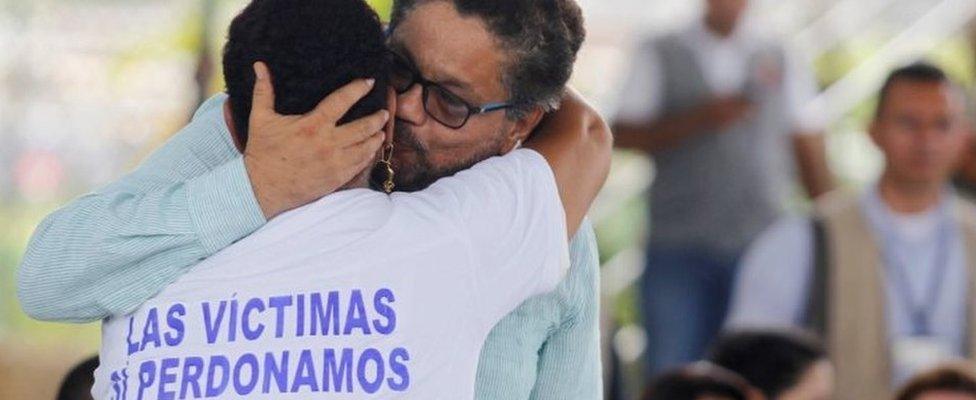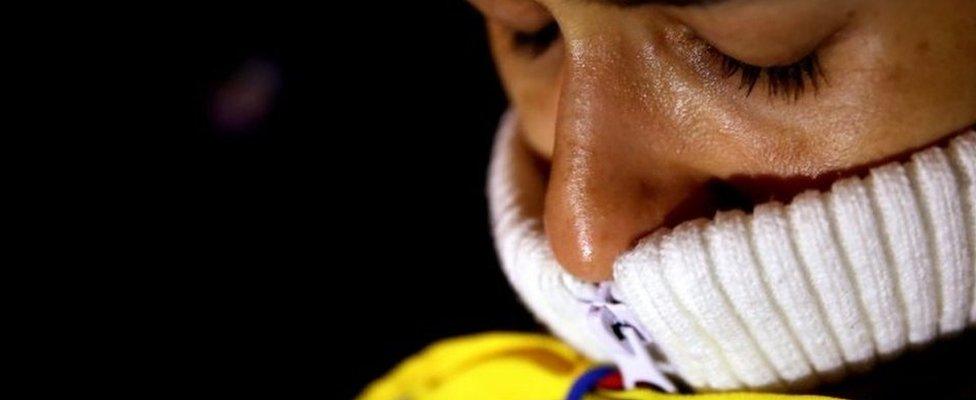Colombia signs new peace deal with Farc
- Published
President Santos and Farc leader Londono were met with cheers of "Yes we could!"
The Colombian government and the country's largest rebel group, the Farc, have signed a revised peace deal.
The previous deal was rejected by the Colombian people in a popular vote on 2 October.
The revised agreement has been submitted to Congress for approval, rather than put to a popular vote.
The deal is aimed at ending five decades of armed conflict, which has killed more than 260,000 people and left millions internally displaced.
The revised deal was signed in a low-key ceremony in the capital, Bogota, and then handed to the president of the Congress.
The ceremony was deliberately kept much smaller than the signing of the previous agreement on 26 September, which was attended by regional heads of state and the United Nations Secretary-General, Ban Ki-moon.
About 800 people were invited to Thursday's ceremony in Colon Theatre rather than the 2,500 who attended the previous ceremony in the port city of Cartagena.
As Farc leader Rodrigo Londono, better known as Timochenko, and President Juan Manuel Santos shook hands after taking turns to sign the document, with a pen made from a bullet, the guests rose to their feet and chanted "Si se pudo" ("Yes, we could").
Timochenko said the agreement "put a definite end to the war so we can confront our difference in a civilised manner".
President Santos said the revised agreement was "better" than the previous one because it addressed many of the concerns of those who had voted "No" in the October referendum.
He warned that its implementation could not be delayed by a single minute and asked the guests to imagine for a moment what it would be like to return to war with the Farc.
He said he expected Congress to vote on the deal as early as next week.
Why was a new deal needed?

President Juan Manuel Santos (L) and Farc rebel leader Timochenko signed the original deal on 26 September
After four years of formal talks between rebel and government negotiators, the two sides reached an agreement earlier this year.
The deal was signed in an emotional ceremony on 26 September.
But Colombian President Juan Manuel Santos had said from the start of the negotiations that he wanted the Colombian people to have a say in the peace process.
He asked them to endorse or reject the peace agreement in a popular vote held on 2 October.
Polls had suggested the deal would pass by a comfortable margin but in a shock result it was narrowly rejected.
What happened next?

The rejection of the peace deal divided the country, newspapers reported
A bilateral ceasefire was extended until the end of the year to give the two sides time to plan their next steps.
President Santos met former President Alvaro Uribe, a vociferous opponent of the peace deal, to listen to his objections.
The government and the Farc then went back to the negotiating table to try to strike a new deal acceptable to those who had voted "no".
Changes were made to almost all of the 57 points in the original agreement.
What are the changes?

Under the new agreement, Farc rebels will have to declare their assets and the money will go towards victims
The five main points which have been changed are:
The Farc will have to declare all their assets and hand them over. The money will be used for reparation payments for the victims of the conflict
Concerns by religious groups that the agreement undermined family values have been addressed
A time limit of 10 years has been set for the transitional justice system
Farc rebels will be expected to provide exhaustive information about any drug trafficking they may have been involved in
The peace agreement will not form part of Colombia's constitution
What now?

The peace deal was left in limbo following its rejection in the popular vote on 2 October
The deal will be voted on in Congress, where the government has a solid majority, probably early next week, ministers say.
The Democratic Centre party, founded by ex-President Uribe, has already said it will vote "No".
Its leaders say that the changes are only "cosmetic" and object to the fact that the government has said the new deal is "final".
It wants more of its demands met, including harsher sentences for Farc rebels who have committed crimes.
It also demanded that the revised deal be put to another popular vote, which President Santos and the Farc have both ruled out.
Other parties in Congress have given the deal their backing, so it is expected to pass.